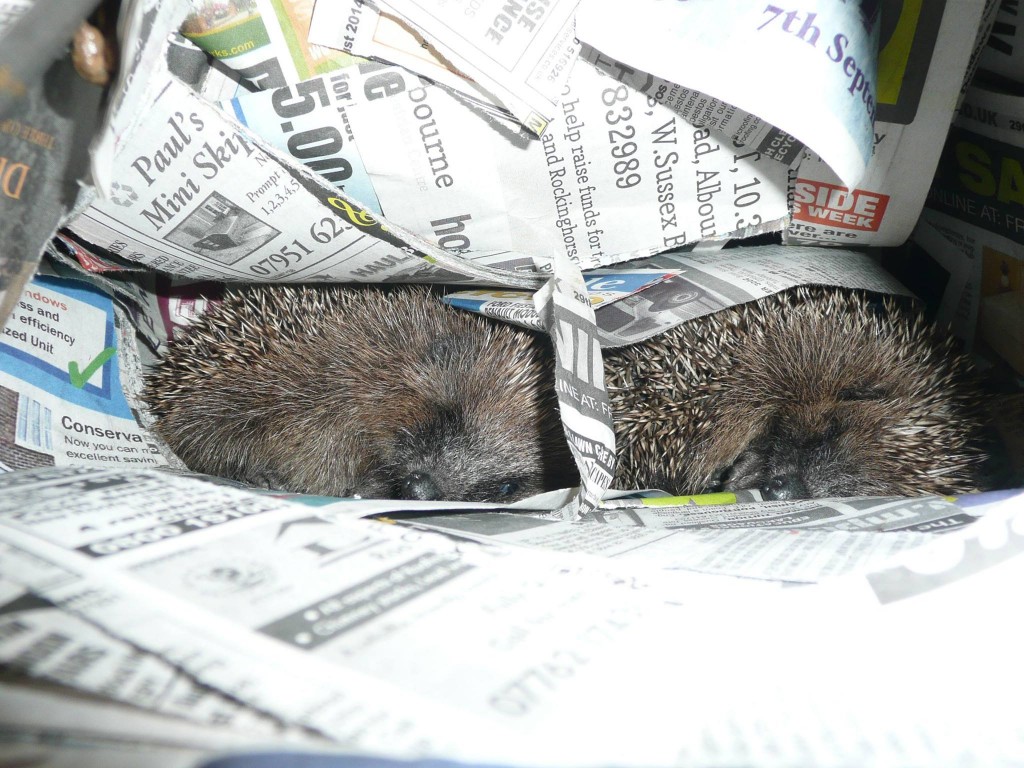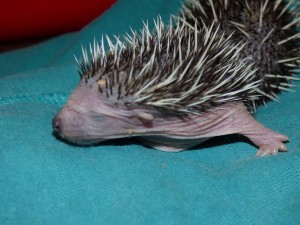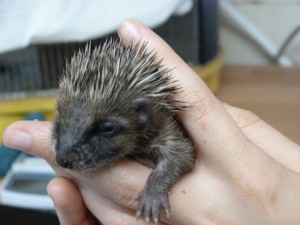
This Summer and Autumn has been good weather for hedgehogs but as a result they have been breeding late into the Autumn as a result of the mild weather. A number of hedgehogs are being admitted to WRAS suffering with pneumonia and other conditions as a result of the colder nights and hedgehogs being born late in the year.
A study undertaken by St Tiggywinkles showed that hedgehogs under 600grams by the end of October had a significantly lower chance of survival that those over 600grams.
Safe Hibernation Weights.
At WRAS we advise people to keep an eye on hedgehogs visiting their gardens, and if they are under 500grams than they should be picked up and taken into care. If mild weather and they are between 500-600grams then we encourage people to feed them up so they can hibernate safely. If a hedgehogs is over 600grams then they should be left alone to hibernate in the wild.
Mum and Baby Hedgehogs

One lady has reported hedgehogs giving birth less than a week ago in a hedgehog box in her garden. We have been asked a number of times recently about when to intervene in situations like this as there is no way the babies will put on enough weight to survive hibernation.
It is important that baby hedgehogs stay with their mum for as long as possible. Please do not disturb them as to do so could cause their mum to abandon them and it is really important that babies get as much of mums milk as possible as the colostrum will help develop their natural immunity and make them stronger.
Why are hedgehogs underweight?
In addition to them being born too late in the year to put on enough weight, it is very common for baby hedgehogs to have parasites problems passed through the placental barrier from mum to babies. They can also be found in natural food like slugs and snails and passed on to hedgehogs.
Hedgehogs suffer from various parasites primarily the capilaria family of parasites like roundworm and lungworm. We also regularly find Crenosoma striatum (lungworm larvae), Brachylaemus erinacei (intestinal fluke) and various coccidial protozoans.
In addition to these they suffer with external parasites primarily two types of mange (meaning mite infestation) and ticks. They also suffer from ringworm which is not a parasite but a fungal infection. This is common during the autumn and winter especially in damp and warm environments.
Many of these problems can be difficult to identify and detect without a microscope and basic training. It is advised that faecal analysis should be undertaken as often as every two days initially as these parasites are not continuously shed in the faeces.
There is no one treatment which will treat all these parasites. Dog and cat wormers are not always suitable nor effective in treating all hedgehog parasites and certainly not recommend without veterinary advice. Over the counter pet treatments from pet food supplier are also not normally suitable or effective enough. Treatments should be targeted based on symptoms and analysis and based on veterinary advice.
There are other illness and diseases which can cause a hedgehog to be underweight. Many of these conditions can be difficult to diagnose without the help of a veterinary surgeon.
Overwintering Hedgehogs.

Overwintering hedgehogs is not just a case of picking them up and looking after them in a hutch over winter. Any hedgehog which is too small to hibernate should be checked over thoroughly and have faecal analysis to check for parasites.
Every year we are called to take in very poorly hedgehogs which people have attempted to overwinter without having them checked over properly first. If you have managed to safely overwinter a hedgehog previous in a hutch means you have been luck if you haven't had it checked over. Very few are that easy.
Hedgehogs Out During the Day.
At any time of the year, if you find a hedgehog out during the day then it should be picked up and taken into care, as they are noctural creatures and only out during the day if there is a problem. The only exception to the rule can be pregnant hedgehogs close to giving birth. WRAS can assess for pregancy and return to the wild any healthy pregnany females - although they would not be returned during the winter.
If you are concerned about a Hedgehog.
If you find a hedgehog and are concerned about its condition contact your local wildlife rescue for help and advice.
East Sussex WRAS can be contacted on 01825-873003 for general advice during the day or for emergencies contact 07815-078234 out of hours.
Other hedgehog and wildlife rescue centres can be found on the interactive map on Hedgehog Bottom's website.
Share this!
